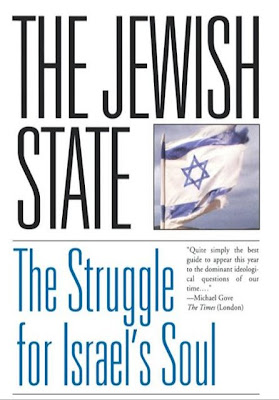 Yoram Hazony's The Jewish State: The Struggle for Israel's Soul is a must read for Zionists and friends of Israel and the Jewish people.
Yoram Hazony's The Jewish State: The Struggle for Israel's Soul is a must read for Zionists and friends of Israel and the Jewish people.
Hazony, at the time the director of the Shalem Center, describes the culturekampf within Israel began by Achad Haam, Judah Magnes and has been continued and extended by the Hebrew University.
In this culturekampf, the Israeli left argues for the rejection of Zionism, the Land of Israel, Jewish nationalism and the Jewish religion.
It was Hebrew University, Hazony relates, which was ideological base from which the views supporting the failed Oslo Agreements penetrated Israeli government and society.
Hazony demonstrates how Herzl, in The Jewish State and in deed, accepted the importance of religion to Jewish identity. Hazony argues that Altneuland, Herzl's novel about life in the Jewish state, was not meant to be a statement of what The Jewish State should look like, but a propoganda tool meant to whoo people to Zionism.
Israel's Left, the ideological descendants of Achad Ha'am (at least as Ha'am's disciples have interpreted his philosophy) are not intrested in either having a state for the Jewish nation or a state which is characteristically Jewish and therefore allows Judaism to play an important role.
Hazony also takes on the allegation that Herzl was detached from the Land of Israel and would have taken any other fesible territory whether it be Argentina or East Africa. Although Herzl suggests Argentina in his book he expressly states that the Land of Israel would be preferrable.
As Herzl's motion that the Congress send an mission to investigate East Africa which almost split the Congress, Hazony gives several explanations for Herzl's behavior.
Herzl's negotiations with the Turkish Sultan who controlled Palestine had reached their end. And the Zionist movement needed constant action and energy to be sustained. Additionally it seemed that a catastrophe faced Russian Jewry. Along came the sympathetic British offering an alternative. To sustain the movement and provide a shelter in the night to persecuted Jewry any territory would do. After the Holocaust, Hazony asks, how can anyone doubt the altruism of such motives?
Hazony also argues that Herzl could not simply turn down a British offer. It was important for him to sustain negotiations with any world players who were interested in Zionism, especially a powerful one like Britian. He could not simply and insultingly say no. In the end it was Herzl's contacts with the British that served as a foundation for Jabotinsky and Weizman to respectively obtain from the British the Jewish Legion to fight in Palestine and the Balfour Declaration,
As mentioned, Herzl viewed other territories as a mere shelter in the night. The British also discussed with Herzl the possibility of offering the Jews El-Arish in the Sinai. Ultimately, British officials in Egypt rejected this proposal. But Herzl envisioned Jewish armies coming forth from the Sinai to conquer Palestine.
More than merely invoking Herzl's The Jewish State in the title, Hazony's book makes a good campanion to Herzl's manifesto. Hazony contrasts Herzl's philosophy of Jewish government with that of Rousseau's "social contract."
According to Rousseau, a society is merely the contract between the people living in a particular place. Under this philosophy, Jews would have no right to govern the Land of Israel without Arab consent. Herzl, however, believed that the Jewish government would act as a proxy for the Jews who were in many different areas of the world and were too weak too act on their own.
One fault with the book, which isn't major, is that Hazony views Ben-Gurion's flip-flopping on every major issue as a positive trait. While Hazony recognizes the correctness of Jabotinsky's views, he doesn't seem to embrace Jabotinsky himself. Instead he praises Ben-Gurion. In this way, Hazony clings irrationally to the suppossed majesty of Ben-Gurion and Labor Zionism.

